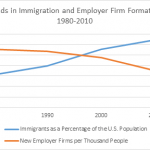
Small enterprise proprietors are more and more pissed off through government law, which they say hasend up a prime hassle in recent years. Twenty- percentage of small commercial enterprise ownerssurveyed to the national Federation of independent enterprise’s November member survey (PDF) say that governmental law and crimson tape is the most crucial problem that they face these days, simply onepercent factor fewer than the fraction that identified taxes the number one trouble.
furthermore, the fraction calling law their largest difficulty is far better nowadays than it became in themid-Eighties while roughly 10 percent of proprietors identified government guidelines and oversight as their number one problem.
Now researchers at a variety of assume tanks are starting to trust that government regulation is doingextra than causing marketers to gripe. they may be concerned that growing regulation can be keepingmight-be entrepreneurs from beginning businesses.
during the last 3-and-a-half of many years, federal law has been growing, at the same time as newcommercial enterprise advent has been falling, because the chart above shows. Researchers on theEwing Marion Kauffman foundation, the Hudson Institute, the Hoover group and the heritage foundationtrust the pattern is extra than a coincidence.
The according to capita fee of recent agency enterprise advent and quantity of guidelines pages in theFederal register — a not unusual measure of the scope of federal regulation — correlate –0.67 over the 1977 to 2012 duration. in addition, the in line with capita charge of commercial enterprise creation and the range of pages within the Code of Federal regulation — any other often used estimate of presidencyrulemaking — correlate –0.seventy eight over the identical length. (A correlation of one.00 method thatnumbers flow in perfect live performance.)
Correlation doesn’t mean causation, of course. however researchers have numerous reasons to considerthat rising law is deterring entrepreneurship. First, as Jonathan Ortmans, a Senior Fellow at the Ewing Marion Kauffman foundation, instructed the U.S. residence Committee on Small business, Subcommittee on Contracting and personnel in September, extra regulations increase the complexity (PDF) of joggingcorporations. This, in flip, deters humans from starting them. 2nd, as Anthony Kim of the historyfoundation explains, the rising fee of complying with rules makes marginal entrepreneurial endeavors uneconomical, which additionally causes the start-up fee to decline.
growing regulation is specially difficult to entrepreneurs. current corporations often have experiencein dealing with regulators and in complying with their guidelines, which permits them to locate higher andless expensive approaches to manipulate the regulatory burden. furthermore, regulatory compliancefrequently has a high fixed fee. As a result, smaller organizations (which tend to be younger) usuallyface a higher fee of adhering to rules.
So What are we able to do to restore the problem?
One concept is to restrict regulation on new companies. John Dearie, executive vp of the financialofferings forum has cautioned that Congress restriction rules on agencies less than six years vintage tosimplest “essential product protection, environmental, and worker protection policies.” A young–employer-regulatory-exemption could allow entrepreneurs to get their businesses up and strolling beforefacing the onslaught of federal policies, which could encourage greater human beings to beginagencies.
any other idea is to cull from the rulebooks guidelines which are obsolete and unnecessary. The creationof a federal fee to review rules and to signify to Congress the ones that might be eliminated and the inclusion of sunset dates on all federal guidelines are approaches to trim the regulatory underbrush.
while policymakers may not want to undertake these suggestions, they want to behave. The proof is mounting that growing law is hindering entrepreneurial hobby.




